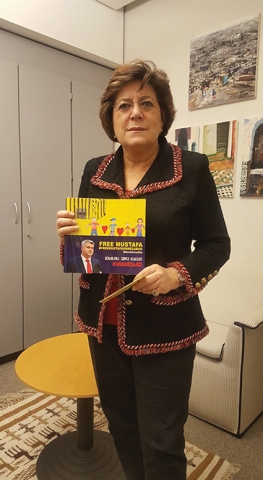MEP Ana Gomes on the Mustafa Cabuk Case
Exclusive Interview
EDITOR'S NOTE: The newspaper version of this interview incorrectly stated Mr. Tim Ogden as the interviewer.
The jury’s still out on Georgia – that’s the feeling you get when asking certain members of the European Parliament as to what they think of the two of the more dubious cases of late: that of journalist Afghan Muktharli’s abduction (allegedly on behalf of the Azerbaijani government) and the Turkish teacher, Mustafa Cabuk, enduring months-long detention time in Georgia at the behest of the Turkish government who thinks him a terrorist. To the West, the charges in both cases are trumped up (no pun intended). And while Muktharli has been sentenced to six years in prison, Cabuk is awaiting the Georgian court’s potentially fatal decision on whether to extradite him to Turkey (as of going to press, postponed to February 19), where he is thought to be certain to face unfair trial and jail time.
One of the few remaining hopes of him escaping Erdogan’s “justice” is if President Margvelashvili were to grant him asylum – something one of the MEP’s GEORGIA TODAY spoke to in Brussels, Ana Gomes, Member of the Committee on Civil Liberties, Justice and Home Affairs, thinks would be “a great service to the country of Georgia.”
Note: this is first of the series of interviews GEORGIA TODAY conducted in the European Parliament regarding the cases of Afghan Mukhtarli and Mustafa Emre Cabuk, the remainder of which will follow in future issues.
How do you think these cases affect Georgia’s international reputation?
It will affect the reputation of Georgia if the extradition actually happens. It will affect positively the Georgian reputation if Georgia refuses to extradite, because it will show that Georgia is able to withstand the pressure of its bullying neighbors, Turkey and Azerbaijan. I’m pretty sure that if somebody was running away from Russia asking for asylum or trying to find safe haven in Georgia, they would not hand that person over to Russia. I know it’s a tough neighborhood; I know it’s tough for the authorities to resist all this pressure, but I also know this is in line with what the majority of Georgia’s citizens think, and it is certainly in line with the commitments of Georgia under the Council of Europe and the commitments towards the EU. It is in the context of the partnership to resist any pressure to hand people over that we know are not terrorists, but activists, human rights defenders and so on.
Muktharli was sentenced for being an investigative journalist, while we are told that Cabuk is being labeled and charged as a terrorist for selling shares. Neither are recognized as terrorists by the West or international law norms. What’s your take on these charges?
We are making the distinction that the Azerbaijani authorities engineered all the kidnapping, but the Georgian authorities need to explain their role in the situation. We need to know whether there was a glaring violation of its sovereignty by the Azerbaijani authorities or if there was complicity from anyone within the Georgian system with the Azerbaijani authorities in organizing the kidnapping. That’s an international crime under international law. Mukhtarli was tried in a totally unfair trial. The last time I was in Georgia, I also raised questions regarding Mustafa, because we could see pressure coming from Turkey. Turkish citizens were running schools in Georgia very peacefully and they were being bullied and discriminated against. That is not acceptable.
What was the response from the Georgian authorities?
There was acknowledgment that this is a very difficult, sensitive case for Georgia because they are dealing with neighbors. I hope that, ultimately, the matter will be given to the courts and the courts will refer to international law in the framework of the Council of Europe Convention that Georgia is a signatory party of.
What do you think can be done by the West to help Georgia not to sway from the path of European values, rule of law and so on?
I hope that all European authorities, not just us parliamentarians, will be vocal in supporting the authorities to deny any pressure coming from bulling neighbors.
How principled is the stance of European institutions? What leverage do they have?
There are contradictions within the EU. Don’t forget the deal that several EU countries have with Turkey regarding refugees. I was one of those who denounced the deal being at the expense of our obligations in terms of refugees and asylum seekers, as it being illegal, immoral and inefficient. If I see that they aren’t living up to their obligations, I say so. I think the EU, Germany and all countries supporting Germany in pretending that this deal is legal, are wrong, very wrong. That’s explains the many contradictions among EU interlocutors, including other parliamentarians, who see refugees and migrants as a big threat.
A group of Georgian NGOs have asked the President of Georgia to grant Cabuk asylum so he is not extradited. As a seasoned politician, what do you think of this request?
I think that President Margvelashvili would do a great service to Georgia if he uses the powers he has to prevent the extradition, should it be come to pass.
Interview conducted by a GT Team representative












